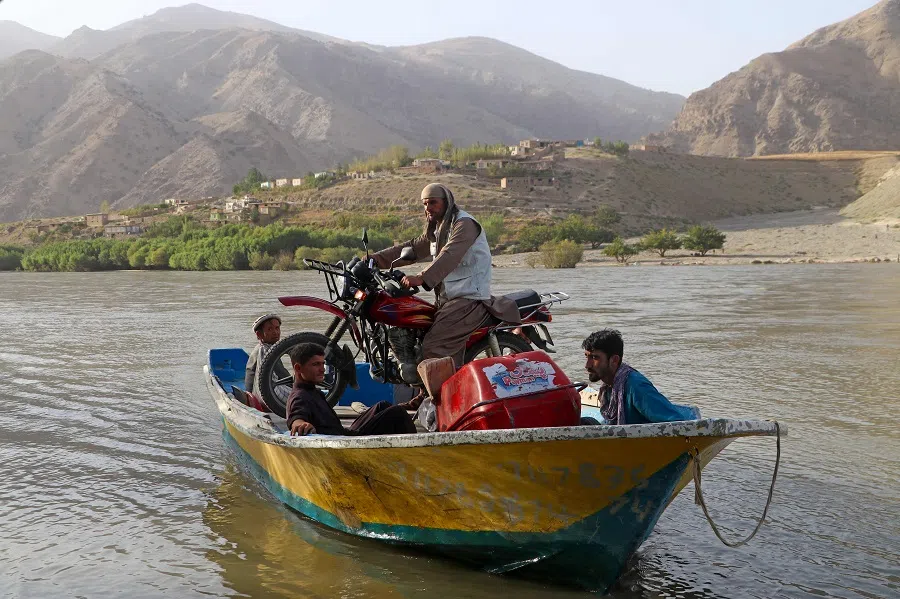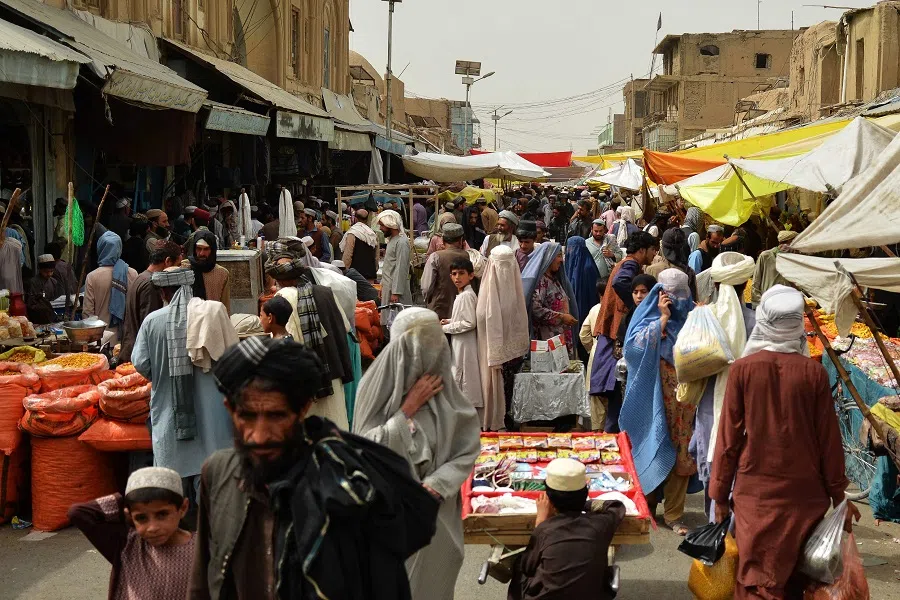Is China engaged in resource politics in Afghanistan?
With increasing stakes in Afghanistan's vast mineral and energy deposits, China is engaged in resource politics in the war-wracked but resource-rich country. Maintaining control of the country's strategic mineral and energy reserves is the name of China's new great game in Afghanistan.

China is striking deal after deal with the ruling Taliban to take advantage of Afghanistan's vast mineral and energy resources. Just three months after signing a 25-year contract in January that sees investment of up to US$540 million over three years for oil extraction from the Amu Darya basin in northern Afghanistan, a Chinese firm apparently offered a US$10 billion investment to mine the country's vast lithium deposits.
Afghanistan is rich in energy and mineral resources, and has been dubbed the "Saudi Arabia of Lithium" due to its vast lithium deposits. Mes Aynak, 40 km southeast of Kabul, is believed to be the world's second largest copper mine. The oil deposits in the country's north alone are estimated at 1.8 billion barrels.
Following the withdrawal of US forces from Afghanistan in 2021, China has positioned itself well with the Taliban regime to keep its dominance over the Afghan mineral industry. Its romance with the Taliban grows amid the world's criticism of the Taliban's violation of human rights. While China has not yet recognised the Taliban regime, it has not abandoned Afghanistan to safeguard its strategic interests. The cash-strapped Taliban government direly needs Chinese cash, in light of the various international economic sanctions that it is under.
Is China monopolising the Afghan mining sector?
Will China really develop Afghanistan's mineral resources or is it just taking control over the resources and monopolising the country's mineral sector? China obviously has the capability as state-run China Metallurgical Group Corp, or MCC, has developed the Saindak copper mine and lead and zinc mines in neighbouring Pakistan. But the question here is the timing.
"The Chinese currently want to control the strategic minerals of Afghanistan without developing them over the next decade or more." - Javed Noorani, a freelance researcher and expert on Afghan mining in Kabul

Presently, China has no plans for the development of mineral resources. For example, China did not develop the Mes Aynak copper mine in the past 15 years and still, it has not started practical work on copper mining under two years of Taliban rule. Similarly, the previous Afghan government had cancelled the contract China signed in 2011 for the extraction of oil from the Amu Darya basin because the Chinese were unable to implement it due to security and profit-sharing issues. China got back the oil contract in January this year after renegotiating it with the Taliban.
"The Chinese currently want to control the strategic minerals of Afghanistan without developing them over the next decade or more. China is involved in competition and in fact, has an edge over everyone in the game," Javed Noorani, a freelance researcher and expert on Afghan mining in Kabul, told this researcher. "In the shadow minerals politics in Afghanistan, the Chinese want to extend its Belt and Road Initiative (BRI), which is more important at this point. Chaining Afghanistan into BRI will take them three steps closer to monopolising the mining sector of Afghanistan," Noorani added.
Presently, China seems desperate to get hold of the oil, lithium and copper mines in Afghanistan with an aim to control global prices of the strategic minerals. China consumes 50% of the world's copper and they have a firm eye on the price of copper globally. If they develop Mes Aynak copper mine, it may impact their leverage on prices. They therefore will keep Aynak for the right timing to develop it.

Going by the assessments of analysts such as Noorani, the Chinese have been waiting for the inclusion of Afghanistan into its BRI before embarking on any development of the mines under their control. The inclusion of Afghanistan was confirmed recently in May, when the foreign ministers of China, Afghanistan and Pakistan agreed to extend China-Pakistan Economic Corridor (CPEC), the flagship project of China's BRI, to Afghanistan. The CPEC extension will develop infrastructure in the war-torn country and would help the Chinese to corner the huge mineral wealth.
By controlling Afghanistan's vast lithium deposits, China wants to further tighten its grasp on much of the global supply chain for EV minerals.
China's appetite for lithium
In particular, China has a voracious appetite for lithium. Afghanistan's Kunar, Nuristan, and Helmand provinces have huge lithium deposits. Lithium is the strategic mineral used in rechargeable batteries and clean technologies. Being the world's largest market for new energy vehicles, China needs Lithium for the growth of its electric vehicle industry. By controlling Afghanistan's vast lithium deposits, China wants to further tighten its grasp on much of the global supply chain for EV minerals.
"To the Chinese," Noorani said, "Afghan lithium, Tantalum, copper, onyx and iron are important. They have their eyes on getting them. The Chinese want lithium to deny other countries to invest in the sector."
Gochin is the alleged Chinese mining firm, which has offered US$10 billion investment to mine the lithium reserves within Afghanistan and build a hydroelectric power station for its processing. The offer includes the creation of 120,000 direct and one million indirect jobs for Afghan people.

Some analysts however do not see great power competition in the absence of China's competitors in Taliban-led Afghanistan.
"China is keen to act on its investments in Afghanistan's mining industry. It hasn't been investing for so long just for show. But the difficult security environment - first the war and now terrorism risks - has limited its options in terms of project implementation," Michael Kugelman, an expert on South Asia affairs at the Wilson Center in Washington told this researcher.
Threat to Chinese interests in Afghanistan
In fact, the biggest challenge China faces in Afghanistan is on the security front. Last December, a terrorist attack on a hotel popular with Chinese business people in Kabul killed three attackers and wounded at least two dozen people including five Chinese nationals. The attack was claimed by Islamic State Khorasan Province (IS-K). In January, a suicide attack by IS-K outside the foreign ministry in Kabul killed at least five people at a time when a Chinese delegation was present there.
The attacks in Kabul are a reminder of the threat that terrorist outfits like IS-K and East Turkestan Islamic Movement (ETIM) pose to the Chinese interests in Afghanistan.

"For Beijing, the main worry is security risks. IS-K has targeted Chinese interests in Afghanistan in the past. China also worries about ETIM, a terror group mainly comprised of Uighur militants. Beijing tends to exaggerate the ETIM threat - it's inflicted more damage in the Middle East than in Afghanistan - but ETIM, unlike IS-K, has traditionally had a warm relationship with the Taliban," said Kugelman.
The China-Taliban romance, however, lacks the trust the two partners must have.
Is international isolation of the Taliban benefiting China?
The globally isolated Taliban, which control Afghanistan, have proven more beneficial to China, which finds an open field without any competitors to hold over and exploit Afghanistan's mineral bonanza.
China's growing stakes in Afghanistan have triggered a discussion that the US abandoning Afghanistan means providing China with an open field to strike big mining deals in the country sitting on mineral reserves worth over US$3 trillion.
The China-Taliban romance, however, lacks the trust the two partners must have. Though the Taliban have invited China to make investments in the internationally abandoned Afghanistan, they are suspicious of Chinese plans. While China is rapidly increasing its stakes in the country, its concerns about the presence of Uighur separatists in Afghanistan are not over.
Related: Afghanistan's role in changing the power balance in Eurasia | The India-Pakistan saga at the SCO foreign ministers' meeting: The China factor | Why Baloch separatists in Pakistan want China's BRI out | Chinese researcher: How to protect the BRI and keep Chinese enterprises overseas safe | China's urgent need to safeguard lives and investments along BRI





